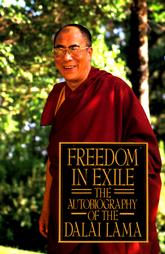 W
WCash: The Autobiography is a 1997 autobiography of Johnny Cash, country musician, written twenty years after his first autobiography, Man in Black. Cash co-wrote this book with Patrick Carr. Cash's autobiographies were the basis for the biopic Walk the Line in 2005.
 W
WFreedom in Exile: The Autobiography of the Dalai Lama is the second autobiography of the 14th Dalai Lama, released in 1991. The Dalai Lama's first autobiography, My Land and My People, was published in 1962, a few years after he reestablished himself in India and before he became an international celebrity. He regards both of the autobiographies as authentic and re-issued My Land and My People in 1997 to coincide with the release of the film Kundun.
 W
WThe Jew in the Lotus is a 1994 book by Rodger Kamenetz about a historic dialogue between rabbis and the Dalai Lama, the first recorded major dialogue between experts in Judaism and Buddhism. The book was a popular success and became an international best-seller. Writing in the New York Times, Verlyn Klinkenborg cited its broader relevance as a book "about the survival of esoteric traditions in a world bent on destroying them." The book was primarily potent in capturing an ongoing engagement in the US between Jews, often highly secularized, and Buddhist teachings. Kamenetz popularized the term JUBU or Jewish Buddhist, interviewing poet Allen Ginsberg, vipassana teacher Joseph Goldstein, Ram Dass and other American Jews involved with bringing Eastern traditions to the West. The book also made prominent a Jewish mystical response to Eastern spirituality in the Jewish renewal movement, led by Rabbi Zalman Schachter-Shalomi, and Jewish meditation as taught by Rabbi Jonathan Omer-Man. The title is a pun on the Vajrayana mantra Om mani padme hum which is frequently interpreted as "hail to the jewel in the lotus".
 W
WThe Left Hand of God: Taking Back Our Country from the Religious Right is a 2006 book by Rabbi Michael Lerner. In it, Lerner argues that in order for progressive politics to survive in America, liberals must develop a respect for progressive forms of religion that can provide inspiration and a sense of "meaning" in people's lives. Lerner argues that the Religious right seduces many well-intentioned Americans who hunger for higher purpose into supporting political candidates whose policies ultimately exacerbate the spiritual and moral vacuum that creates the desperation that makes the Religious Right appealing in the first place.
 W
WThe Legacy of Luna is a 2000 book written by Julia Butterfly Hill about her experiences while treesitting in a tree named Luna in the late 1990s.
 W
WThe Measure of a Man: A Spiritual Autobiography is an autobiographical work by Sidney Poitier. On January 26, 2007, Oprah Winfrey chose it for her book club.
 W
WThe Monk Who Sold His Ferrari is a self-help book by Robin Sharma, a writer and motivational speaker. The book is a business fable derived from Sharma's personal experiences after leaving his career as a litigation lawyer at the age of 25.
 W
WA New Christianity for a New World: Why Traditional Faith Is Dying and How a New Faith Is Being Born is a theological book by Episcopalian bishop John Shelby Spong, published in 2001, in which he outlines his ideas for doctrinal changes within Christianity in the modern world.